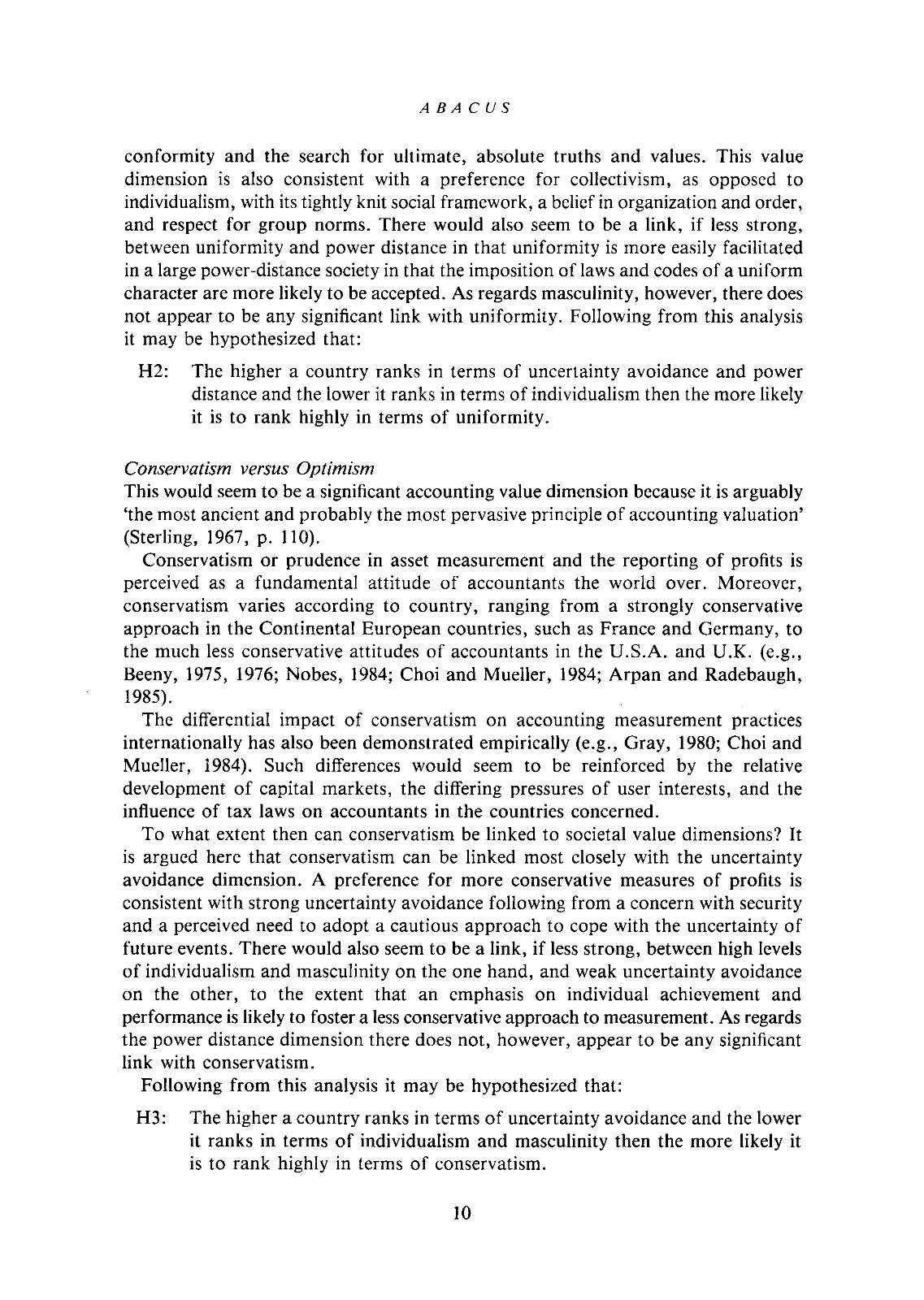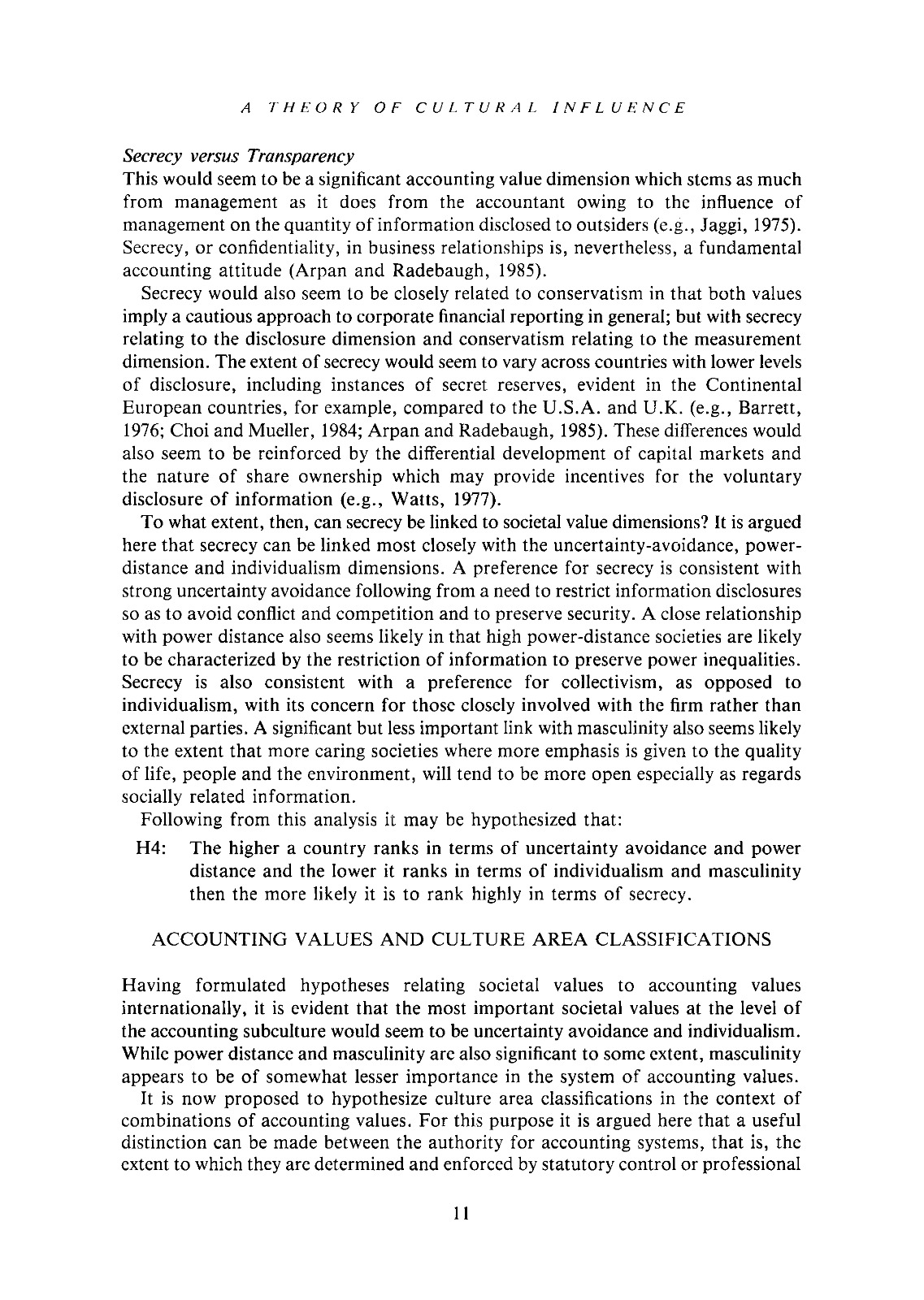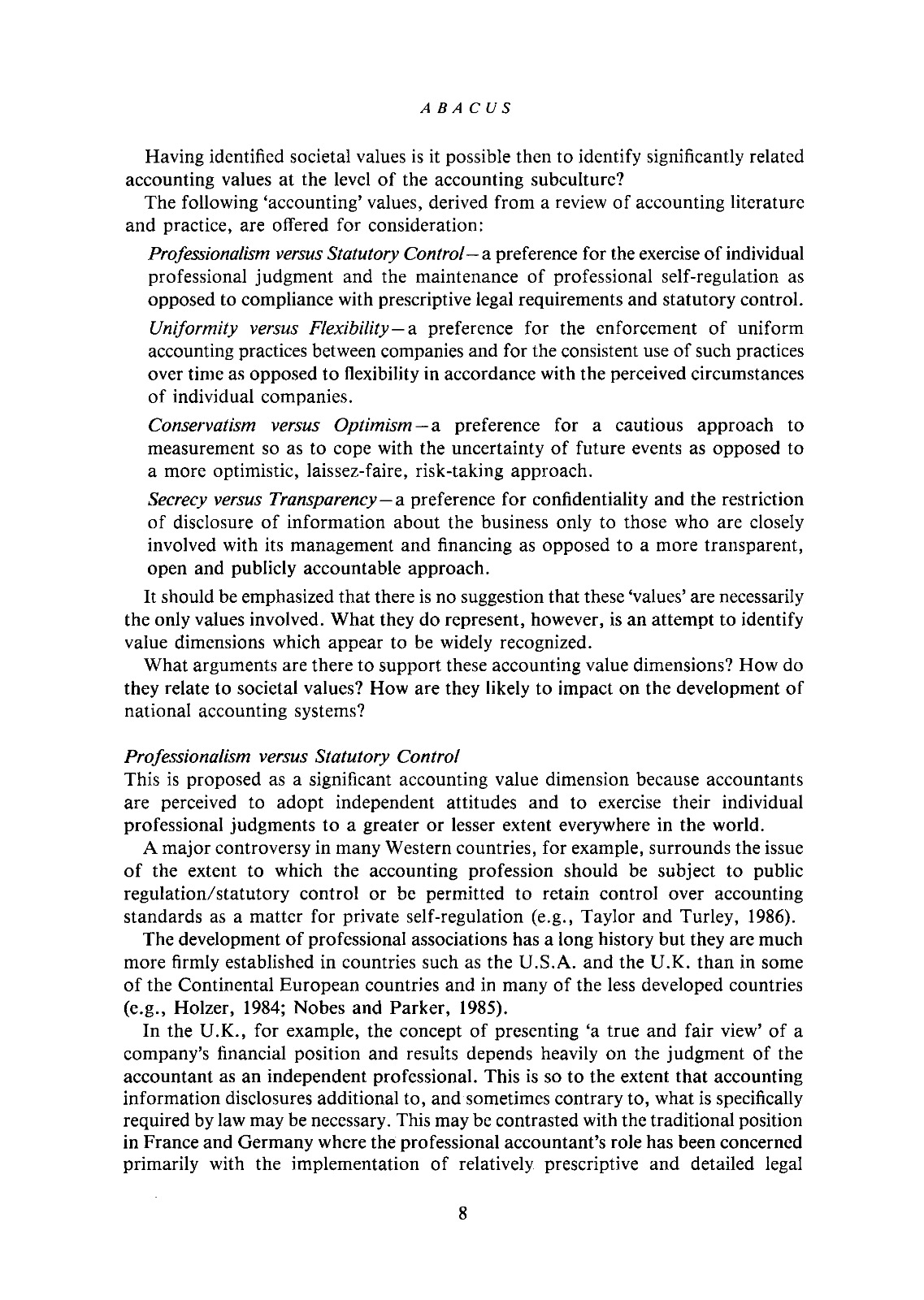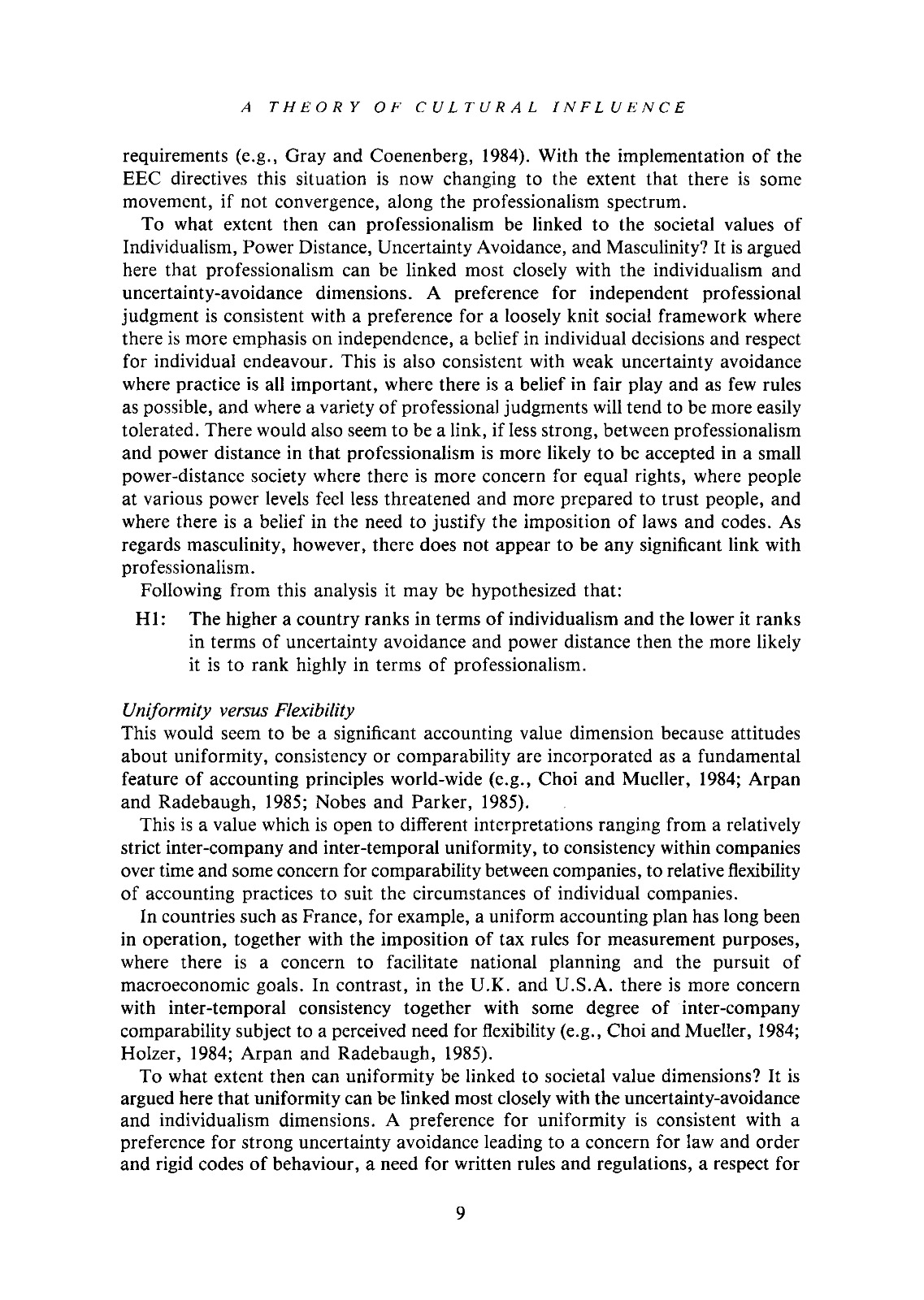ABACUS conformity and the search for ultimate, absolute truths and values. This value dimension is also consistent with a preference for collectivism, as opposed to individualism, with its tightly knit social framework, a belief in organization and order, and respect for group norms. There would also seem to be a link, if less strong, between uniformity and power distance in that uniformity is more easily facilitated in a large power-distance society in that the imposition of laws and codes of a uniform character are more likely to be accepted. As regards masculinity, however, there does not appear to be any signicant link with uniformity. Following from this analysis it may be hypothesized that: H2: The higher a country ranks in terms of uncertainty avoidance and power distance and the lower it ranks in terms of individualism then the more likely it is to rank highly in terms of uniformity. Canservatr'sm versus Optimism This would seem to be a signicant accounting value dimension because it is arguably 'the most ancient and probably the most pervasive principle of accounting valuation' (Sterling, 1967, p. 110). Conservatism or prudence in asset measurement and the reporting of prots is perceived as a fundamental attitude of accountants the world over. Moreover, conservatism varies according to country, ranging from a strongly conservative approach in the Continental European countries, such as France and Germany, to the much less conservative attitudes of accoantants in the U.S.A. and UK. (e.g., Beeny, 1975, 1976; Nobes, 1984; Choi and Mueller, 1984; Arpan and Radebaugh, 1985). , _ The differential impact of conservatism on accounting measurement practices internationally has also been demonstrated empirically (e.g., Gray, 1980; Choi and Mueller, 1984). Such diiferences would seem to be reinforced by the relative development of capital markets, the differing pressures of user interests, and the inuence of tax laws on accountants in the countries concerned. To what extent then can conservatism be linked to societal value dimensions? It is argued here that conservatism can be linked most closely with the uncertainty avoidance dimension. A preference for more conservative measures of prots is consistent with strong uncertainty avoidance following from a concern with security and a perceived need to adopt a cautious approach to cope with the uncertainty of future events. There would also seem to be a link, if less strong, between high levels of individualism and masculinity on the one hand, and weak uncertainty avoidance on the other, to the extent that an emphasis on individual achievement and performance is likely to foster a less conservative approach to measurement. As regards the power distance dimensiou there does not, however, appear to be any signicant link with conservatism. Following from this analysis it may be hypothesized that: H3: The higher a country ranks in terms of uncertainty avoidance and the lower it ranks in terms of individualism and masculinity then the more likely it is to rank highly in terms of conservatism. lO A THEORY OF CULTURAL INFLUENCE Secrecy versus Transparency This would seem to be a signicant accounting value dimension which stems as much from management as it does from the accountant owing to the inuence of management on the quantity of information disclosed to outsiders (e. g'., laggi, 1975). Secrecy, or condentiality, in business relationships is, nevertheless, a fundamental accounting attitude (Arpan and Radebaugh, 1985). Secrecy would also seem to be closely related to conservatism in that both values imply a cautious approach to corporate nancial reporting in general; but with secrecy relating to the disclosure dimension and conservatism relating to the measurement dimension. The extent of secrecy would seem to vary across countries with lower levels of disclosure, including instances of secret reserves, evident in the Continental European countries, for example, compared to the U.S.A. and U.K. (e.g., Barrett, 1976; Choi and Mueller, 1984; Arpan and Radebaugh, 1985). These differences would also seem to be reinforced by the differential development of capital markets and the nature of share ownership which may provide incentives for the voluntary disclosure of information (c.g., Watts, 1977). To what extent, then, can secrecy be linked to societal value dimensions? It is argued here that secrecy can be linked most closely with the uncertainty-avoidance, power- distance and individualism dimensions. A preference for secrecy is consistent with strong uncertainty avoidance following from a need to restrict information disclosures so as to avoid conict and competition and to preserve security. A close relationship with power distance also seems likely in that high power-distance societies are likely to be characterized by the restriction of information to preserve power inequalities. Secrecy is also consistent with a preference for collectivism, as opposed to individualism, with its concern for those closely involved with the rm rather than external parties. A signicant but less important link with masculinity also seems likely to the extent that more caring societies where more emphasis is given to the quality of life, people and the environment, will tend to be more open especially as regards socially related information. Following from this analysis it may be hypothesized that: H4: The higher a country ranks in terms of uncertainty avoidance and power distance and the lower it ranks in terms of individualism and masculinity then the more likely it is to rank highly in terms of secrecy. ACCOUNTING VALUES AND CULTURE AREA CLASSIFICATIONS Having formulated hypotheses relating societal values to accounting values internationally. it is evident that the most important societal values at the level of the accounting subculture would seem to be uncertainty avoidance and individualism. While power distance and masculinity are also signicant to some extent, masculinity appears to be of somewhat lesser importance in the system of accounting values. It is now proposed to hypothesize culture area classications in the context of combinations of accounting values. For this purpose it is argued here that a useful distinction can be made between the authority for accounting systems, that is, the extent to which they are determined and enforced by statutory control or professional ll ABACUS Having identied societal values is it possible then to identify signicantly related accounting values at the level of the accounting subculture? The following 'accounting' values, derived from a review of accounting literature and practice, are offered for consideration: Profasr'onahsm versus Statutory Control a preference for the exercise of individual professional judgment and the maintenance of professional self-regulation as opposed to compliance with prescriptive legal requirements and statutory control. Uniformity versus Flexibilitya preference for the enforcement of uniform accounting practices between companies and for the consistent use of such practices over time as opposed to exibility in accordance with the perCeived circumstances of individual companies. Conservatism versus Optimisma preference for a cautious approach to measurement so as to cope with the uncertainty of future events as opposed to a more optimistic, laissez-faire, risk-taking approach. Secrecy versus Transparencya preference for condentiality and the restriction of disolosure of information about the business only to those who are closely involved with its management and nancing as opposed to a more transparent. open and publicly accountable approach. It should be emphasized that there is no suggestion that these 'values' are necessarily the only values involved. What they do represent, however, is an attempt to identify value dimensions which appear to be widely recognized. What arguments are there to support these accounting value dimensions? How do they relate to societal values? How are they likely to impact on the development of national accounting systems? Professionalism versus Statutory Control This is proposed as a signicant accounting value dimension because accountants are perCeived to adopt independent attitudes and to exercise their individual professional judgments to a greater or lesser extent everywhere in the world. A major controversy in many Western countries, for example, surrounds the issue of the extent to which the aCCOunting profession shOuld be subject to public regulation/statutory control or be permitted to retain control over accounting standards as a matter for private self-regulation (e.g.. Taylor and Turley, 1986). The development of professional associations has a long history but they are much more rmly established in countries such as the U.S.A. and the U.K. than in some of the Continental European countries and in many of the less developed countries (e.g., Holzer, 1984; Nobes and Parker, 1985). In the U.K., for example, the concept of presenting 'a true and fair view' of a company's nancial position and results depends heavily on the judgment of the accountant as an independent professional. This is so to the extent that accounting information disclosures additional to, and-sometimes contrary to, what is specically required by law may be necessary. This may be contrasted with the traditional position in France and Germany where the professional accountant's role has been concerned primarily with the implementation of relatively. pre5criptive and detailed legal A THEORY OF CULTURAL INFLUENCE requirements (e.g., Gray and Coenenberg, 1984). With the implementation of the EEC directives this situation is now changing to the extent that there is 50me movement, if not convergence, along the professionalism spectrum. To what extent then can professionalism be linked to the societal values of Individualism, Power Distance, Uncertainty Avoidance, and Masculinity? It is argued here that professionalism can be linked most closely with the individualism and uncertainty-avoidance dimensions. A preference for independent professional judgment is consistent with a preference for a loosely knit social framework where there is more emphasis on independence, a belief in individual decisions and respect for individual endeavour. This is also consistent with weak uncertainty avoidance where practice is all important, where there is a belief in fair play and as few rules as possible, and where a variety of professional judgments will tend to be more easily tolerated. There would also seem to be a link, if less strong, between professionalism and power distance in that professionalism is more likely to be accepted in a small power'distancc society where there is more concern for equal rights, where people at various power levels feel less threatened and more prepared to trust people, and where there is a belief in the need to justify the imposition of laws and codes. As regards masculinity, however, there does not appear to be any signicant link with professionalism. Following from this analysis it may be hypothesized that: H1: The higher a country ranks in terms of individualism and the lower it ranks in terms of uncertainty avoidance and power distance then the more likely it is to rank highly in terms of professionalism. Uniformity versus Flexibility This would seem to be a signicant accounting value dimension because attitudes about uniformity, consistency or comparability are incorporated as a fundamental feature of accounting principles world-wide (e.g., Choi and Mueller, 1984; Arpan and Radebaugh, 1985; Nobes and Parker, 1985). This is a value which is open to different interpretations ranging from a relatively strict inter-company and inter-temporal uniformity, to consistency within companies over time and some concern for comparability between companies, to relative exibility of accounting practices to suit the circumstances of individual companies. In countries such as France, for example, a uniform accounting plan has long been in operation, together with the imposition of tax rules for measurement purposes, where there is a concern to facilitate national planning and the pursuit of macroeconomic goals. In contrast, in the U.K. and U.S.A. there is more concern with inter-temporal consistency together with some degree of "inter-company comparability subject to a perceived need for exibility (e.g., Choi and Mueller, I984; Holzer, 1984; Arpan and Radebaugh, 1985). To what extent then can uniformity be linked to societal value dimensions? It is argued here that uniformity can be linked most closely with the uncertainty-avoidance and individualism dimensions. A preference for uniformity is consistent with a preference for strong uncertainty avoidance leading to a concern for law and order and rigid codes of behaviour, a need for written rules and regulations, a respect for










